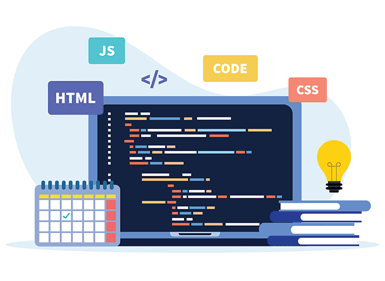Introduction
While there may be a number of criteria people use in selecting a career, one that might be especially important to some is to do work that makes a difference in other people’s lives. Not everyone is cut out to work in what we traditionally think of as the “helping” professions—doctors, nurses, teachers, counselors, social workers. But thanks to technology, there are ways to make a positive impact on the lives of many through other types of careers.
If you love all things tech, but also consider making a difference in the world to be a priority, consider pursuing a career as a web developer. This article focuses on how web developers make a difference. It also explores how to become a web developer, what a web developer does, how much they make, and their employment outlook.
How to Become a Web Developer
There are several pathways you might follow to become a web developer, depending on your experience level and available time.
What degree do you need to be a web developer?
You don’t necessarily need a degree to become a web developer. Education requirements could range from a high school diploma to a bachelor’s degree.
If you have a high school diploma, you will need to have the experience and skills that employers are looking for. Typically you’ll be expected to have a thorough understanding of how to program using HTML. Employers might also want you to have experience in other programming languages, such as SQL or JavaScript.
Some employers prefer to hire web developer candidates who have a bachelor’s degree in a specific field, such as computer science or programming. You’ll also typically earn more and be less likely to be unemployed if you have a bachelor’s degree vs a high school diploma:1
| Degree Level | Median Usual weekly earnings | Unemployment rate |
|---|---|---|
| HS Diploma | $899 | 3.9% |
| Bachelor’s Degree | $1,493 | 2.2% |
| Master’s Degree | $1,737 | 2.0% |
In addition, even if an employer doesn’t require a degree, you might have an advantage over other candidates who don’t have one.
While a master’s degree is not typically required to be a web developer, you might need one if you are looking to move into management.
Another non-degree route you might take to become a web developer is to attend a bootcamp. Tech bootcamps were designed to teach career-ready skills in a short period of time. A bootcamp might take anywhere from 3–6 months.
What will I study in a web developer program?
Regardless of the education path you take, you’ll likely learn about topics such as:
- Programming languages, such as Python, Java, and SQL
- Web development fundamentals, including HTML and CSS
- Computer architecture
- Math courses such as algebra and calculus
- Science courses such as physics
- Networking fundamentals
- Databases
- Ethical issues
A bachelor’s program will typically also include general education courses such as English.
How long does it take to become a web developer?
The time it will take you to become a web developer could vary depending on which education path you take and your available time. Earning a bachelor’s degree generally takes 4 years of full-time study. Bootcamps might take 3 to 6 months. Master’s degree programs take 1 to 2 years.
What Is a Web Developer?
A web developer is a professional who specializes in the design, creation, and maintenance of websites and web applications. They are skilled in programming languages such as HTML, CSS, and JavaScript, as well as various frameworks and tools used for web development.
Web developers collaborate with clients or stakeholders to understand their requirements and objectives for the website or web application. They then use their technical expertise to translate these requirements into functional and visually appealing web solutions.
What does a web developer do on the job?
While some web developers do it all, others deal with just one aspect of web development: front-end development, back-end development, full-stack development, and managing a site (webmaster).
Front-end developer
Front-end developers focus on the user interface and user experience aspects of websites and web applications. They are responsible for implementing the visual design of a website, ensuring it is responsive and accessible across different devices and browsers. Front-end developers use HTML, CSS, JavaScript, and front-end frameworks such as React or Angular to create interactive and engaging user interfaces.
Back-end developer
Back-end developers work on the server side of web development, handling the logic, database interactions, and server operations that power dynamic web applications. They use programming languages such as Python, Ruby, PHP, or JavaScript (Node.js) to build server-side logic, interact with databases, and manage server infrastructure. Back-end developers also work with frameworks and tools such as Django, Ruby on Rails, Laravel, or Express.js to streamline development tasks.
Full-stack developer
Full-stack developers have proficiency in both front-end and back-end development, allowing them to work on all aspects of web development from the user interface to the server-side logic. They are well-versed in a wide range of technologies and frameworks, enabling them to handle various aspects of web development projects independently or as part of a team.
Webmaster
A webmaster, also known as a web administrator or website manager, is an individual responsible for the maintenance, operation, and overall management of a website or group of websites. The role of a webmaster encompasses various technical, administrative, and strategic tasks related to ensuring the functionality, security, and performance of a website.
Web developer jobs
As mentioned above, there is more than one type of web developer job, each with a different focus. Web developer jobs may also be found in many different industries.
For example, healthcare companies might use web developers to create websites that serve as patient portals, allowing patients to review their health histories. Hospitals and medical clinics could hire web developers to create websites that handle administrative tasks and thus increase productivity.
Other industries that hire web developers include:
- Computer systems design
- Finance
- Education
- Software publishing
- Advertising and public relations
- Retail
- Management, scientific, and technical consulting
And companies large and small are realizing the benefits of and need for having a website to promote their business. Some companies might use self-employed web developers rather than have them on staff.
Web Developer Salary and Job Outlook
Good news—web developers are in demand. According to the BLS, between 2023 and 2033, the projected growth for this occupation is 16%, which is much faster than average. Projected employment in 2033 is 115,500.2
The median annual salary for web developers in May 2023 was $92,750 —which is significantly more than the salary of the average U.S. worker. Salaries may vary, however, based on industry and location.
The highest-paying industry in 2023 was software publishing, with a median annual wage of $126,480.3
The top-paying states for web developers in 2023 were:4
| State | Annual mean wage |
|---|---|
| Washington | $120,910 |
| Delaware | $107,190 |
| District of Columbia | $123,640 |
| California | $121,490 |
| Virginia | $112,590 |
The top-paying metropolitan areas for web developers in 2023 were:4
| metro politan are | annual mean wage |
|---|---|
| San Jose-Sunnyvale-Santa Clara, CA | $156,480 |
| San Francisco-Oakland-Hayward, CA | $148,820 |
| Seattle-Tacoma-Bellevue, WA | $125,040 |
| Washington-Arlington-Alexandria, DC-VA-MD-WV | $118,080 |
| Rochester, MN | $115,880 |
| Vallejo-Fairfield, CA | $115,760 |
| Santa Maria-Santa Barbara, CA | $115,510 |
| Lynchburg, VA | $115,000 |
| Philadelphia-Camden-Wilmington, PA-NJ-DE-MD | $113,820 |
| Atlanta-Sandy Springs-Roswell, GA | $112,760 |
How Web Developers Make a Difference
Web developers make a difference in so many ways. Anyone who visits their website and benefits from it in any way may be impacted by a web developer. Teachers might get lesson plans from a website to help them improve their teaching. An individual suffering from a disease could learn more about the disease and find treatment resources. A psychologist could learn about new therapies and treatments that might help their patients. The examples could go on and on.
The companies and organizations a website is created for also may be positively impacted in numerous ways. Having a website could help them establish an online presence, reach a wider audience, drive sales and revenue, engage with customers, and stay competitive in today’s digital economy. It might also help them with a concept known as information governance.
Information governance is a framework companies put in place to ensure the confidentiality, integrity, and availability of data and other information. Web developers need to implement information governance principles within the context of website development and management. They put into place security measures such as access controls and encryption. In doing so, they help businesses keep data and information safe.
Conclusion
Whether it’s creating e-commerce platforms, developing educational websites, or implementing and managing information governance frameworks, the work web developers do has the potential of impacting people far and wide. So put your computer and tech skills to good use by pursuing a career as a web developer!
Discover more useful content
Sources:
1. https://www.bls.gov/emp/chart-unemployment-earnings-education.htm
2. https://www.bls.gov/ooh/computer-and-information-technology/web-developers.htm#tab-6
3. https://www.bls.gov/ooh/computer-and-information-technology/web-developers.htm#tab-5
4. https://www.bls.gov/oes/current/oes151254.htm#st





